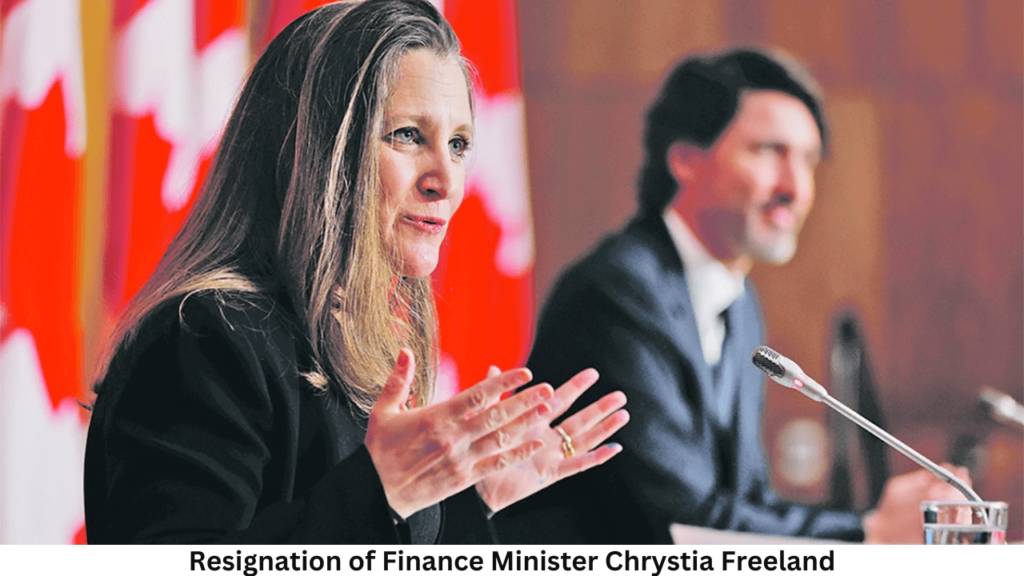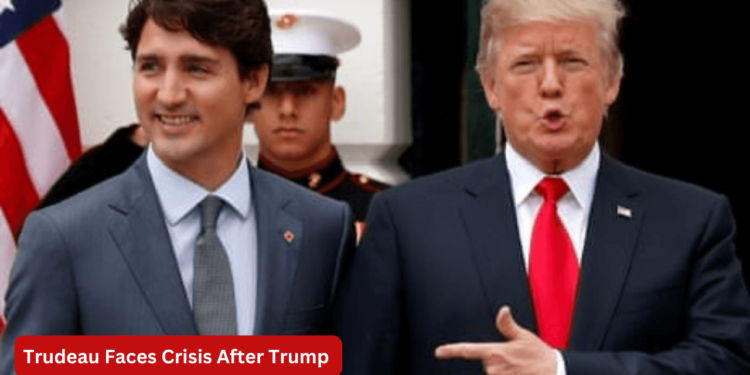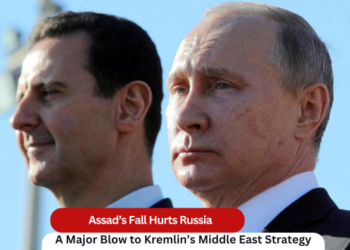Canadian Prime Minister Justin Trudeau’s government has plunged into political disarray following the abrupt resignation of Finance Minister Chrystia Freeland. Her departure has triggered a storm of internal dissent within the Liberal Party, exposed deep divisions in leadership, and placed Trudeau’s political future in jeopardy. This crisis comes as Canada braces for the return of Donald Trump to the U.S. presidency and the economic challenges his policies could bring.
Freeland’s Resignation: A Blow to Trudeau’s Leadership
Chrystia Freeland, a key ally of Justin Trudeau and a long-serving Finance Minister, shocked the nation by stepping down on the same day she was scheduled to present a critical economic update. In her resignation letter, Freeland criticized Trudeau’s approach to addressing Donald Trump’s threats to impose a 25% tariff on Canadian imports.
Freeland accused the Prime Minister of favoring “costly political gimmicks” over serious strategies to counter Trump’s “aggressive economic nationalism.” She argued that Trudeau’s leadership style failed to effectively protect Canada’s economy, which economists warn could suffer devastating consequences if tariffs are enacted.
Her departure came after Trudeau informed her that he no longer wanted her as the government’s top economic adviser—a move that many saw as a breaking point in their relationship.
Political Fallout: Trudeau Faces Crisis After Trump’s Influence Returns
The timing of Freeland’s resignation could not have been worse for Trudeau. With Trump set to return to the White House in January, the Prime Minister’s government is under intense scrutiny over its preparedness to handle U.S.-Canada relations. Freeland’s resignation has left Trudeau isolated, as many of his most experienced ministers have already departed in recent years.
According to political expert Chris Sands, Freeland’s exit “makes Canada look confused and uncertain” at a time when stability is crucial. Sands noted that Trump’s re-election has divided U.S. allies, including Canada, on how to respond to his policies. Trudeau’s strategy of engagement, which included a visit to Trump’s Mar-a-Lago estate, contrasts sharply with Freeland’s call for a more confrontational approach, similar to Mexico’s stance under President Claudia Sheinbaum.
Internal Party Divisions Deepen as Liberals Lose Ground
Trudeau’s leadership is also under fire from within his own Liberal Party. On the day of Freeland’s resignation, eight Liberal Members of Parliament publicly called for Trudeau to step down, citing concerns over his ability to lead the party through the mounting crises.
This internal dissent comes as the Liberals suffered another by-election defeat in Cloverdale-Langley City, their third loss this year. Political analysts say these setbacks reflect growing dissatisfaction with Trudeau’s leadership, which has seen his approval ratings plummet from 63% when he first took office to just 28% as of June.

Trudeau’s Leadership in Question: Will He Resign?
The calls for Trudeau’s resignation have grown louder from both his party and opposition leaders. Pierre Poilievre, leader of the Conservative Party, demanded an immediate federal election, arguing that “everything is spiraling out of control.” With Canada’s next election due by October, Poilievre insists the country cannot afford to wait.
Trudeau, however, remains defiant. Speaking to Liberal Party donors in Ottawa on the day of Freeland’s resignation, he acknowledged the gravity of the situation, saying, “It’s obviously been an eventful day. It has not been an easy day.”
Despite this, Trudeau faces mounting pressure to address concerns about his leadership and to restore confidence within his party. Political observers note that replacing Trudeau may not necessarily improve Canada’s position with Trump, as his policies are likely to affect any Canadian leader.
Trudeau Faces Crisis After Trump’s Tariffs Loom Large
Donald Trump’s aggressive economic policies have created a ripple effect across Canada’s political and economic landscape. During his first term, Trump imposed significant pressure on Canada, leading to the renegotiation of the US-Canada-Mexico free trade pact—a process that Freeland spearheaded under intense strain.
With Trump’s return, Canada faces renewed threats of tariffs and economic instability. Freeland’s resignation highlights the growing divide over how to respond to Trump’s policies. While Trudeau favors a more diplomatic approach, Freeland advocated for a stronger, more combative stance.
What’s Next for Trudeau and Canada?
The political and economic challenges facing Justin Trudeau have created uncertainty for his government and Canada’s future. With Freeland gone, the Liberal Party fractured, and opposition leaders calling for his resignation, Trudeau must navigate a path forward while preparing for the impact of Trump’s policies.
Trudeau’s approval ratings, coupled with by-election losses, suggest that Canadians are losing confidence in his leadership. If a federal election were held today, polls indicate that the Liberals could face a devastating defeat at the hands of the Conservatives.
As Trudeau faces this crisis after Trump’s return to power, the question remains: can he restore stability and regain the trust of his party and the Canadian people?
This unfolding drama will shape Canada’s political future in the months to come. Stay tuned for further updates on how Trudeau’s government addresses these challenges and the long-term implications of Trump’s policies for Canada.














































